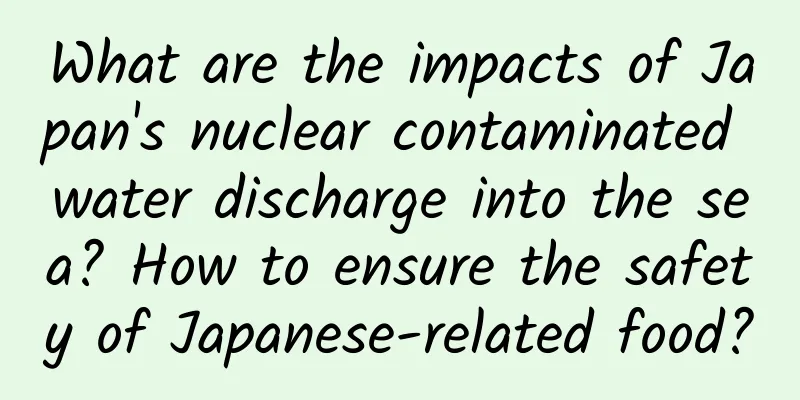What are the impacts of Japan's nuclear contaminated water discharge into the sea? How to ensure the safety of Japanese-related food?

|
At 13:00 local time on August 24 (12:00 Beijing time on August 24), Japan's Fukushima Daiichi Nuclear Power Plant started discharging contaminated water into the sea. Tokyo Electric Power Company said at a temporary press conference held today that the first discharge into the sea will discharge about 460 tons of contaminated water per day for 17 days, with a total of about 7,800 tons of contaminated water discharged. On the 24th, the discharge of contaminated water is expected to be 200 to 210 tons. The daily discharge situation will be announced the next day. According to the plan announced by Tokyo Electric Power Company, there will be an approximately 1-kilometer-long undersea tunnel extending from the water storage tank on the coast of the Fukushima Daiichi Nuclear Power Plant to the Pacific Ocean. The exit of the tunnel will be about 12 meters from the sea surface, and nuclear contaminated water will be discharged into the sea through this tunnel. Despite opposition from many parties, Japan is still determined to discharge nuclear contaminated water into the sea. What impact will this have? How should we respond? What impacts does the discharge of nuclear contaminated water into the sea bring? The multi-nuclide treatment system (ALPS) is the key to the Japanese government and Tokyo Electric Power Company's plan to discharge contaminated water into the sea. The Japanese side insists that the contaminated water treated by ALPS is "treated water" and believes that "treated water" has met the standards and can be discharged. However, this is not the case in reality. First, there is no effective treatment technology for many radionuclides in nuclear contaminated water. The Fukushima nuclear contaminated water contains more than 60 radionuclides, such as tritium, carbon-14, iodine-129, etc. Many of these radionuclides do not have effective treatment technology, but Japan has been misleading that "the problem is only the tritium element." In 2020, the International Environmental Protection Organization pointed out in its investigation report entitled "The Contaminated Water Crisis of the Tokyo Electric Power Company's Fukushima Daiichi Nuclear Power Plant" that there is a high concentration of radioactive carbon-14 in the nuclear contaminated water, and ALPS was not designed to remove carbon-14. The report's author, German researcher Sean Bernie, pointed out that Tokyo Electric Power Company did not admit the existence of carbon-14 in the so-called "treated water" until 2020. The investigation by the International Environmental Protection Organization found that ALPS cannot remove radioactive tritium and carbon-14, nor can it completely remove other radioactive isotopes, such as strontium-90, iodine-129 and cobalt-60. Second, the radioactive nuclides in the nuclear contaminated water affect human health. Japan claims that after dilution with seawater, the tritium concentration in the water will be less than one-fortieth of the Japanese control standard. However, dilution cannot reduce the total radioactive dose of the discharged nuclear contaminated water. Mao Liang, a professor at the School of Environment at Nanjing University, gave an example. "Nuclear radiation exposure can be divided into internal exposure and external exposure. Tritium releases beta rays. When tritium water is discharged into the ocean, algae will use it to synthesize protein organic matter. Algae are food for shrimp and fish, so they will be eaten by fish and shrimp and become protein in the fish and shrimp. Then when we eat fish and shrimp, we may introduce tritium in the protein into the body, and it will become a part of the body. This will cause long-term internal exposure and will inevitably affect health." Gao Zhiguo, president of the China Society of the Law of the Sea and former judge of the International Tribunal for the Law of the Sea, said that after these radionuclides enter the marine environment and ecology, tritium may not be the most dangerous. The most harmful to humans and marine life are carbon-14 and iodine-129. The half-life of carbon-14 is more than 5,000 years, and the half-life of iodine-129 is even longer. Carbon-14 will accumulate in the bodies of marine organisms, that is, fish, and the abundance or concentration of carbon-14 accumulation may be 50 times that of tritium. Third, the impact of nuclear contaminated water is global. The German Marine Science Research Institute pointed out that the coast of Fukushima has the strongest ocean currents in the world. Within 57 days from the date of discharge, radioactive substances will spread to most of the Pacific Ocean. Three years later, the United States and Canada on the other side of the Pacific Ocean will be affected by nuclear contamination, and 10 years later, it will spread to all seas around the world. Japan insists on discharging pollutants into the sea. How can we ensure the safety of food related to Japan? At present, the issue of Japan's nuclear contaminated water discharge into the sea has become a global focus, and has also caused Chinese consumers to worry about the safety of food imported from Japan. After the Fukushima nuclear power plant leak in Japan in 2011, my country has begun to manage the entry of Japanese imported food that may be affected by nuclear contamination in Fukushima Prefecture, Japan. In 2011, the former General Administration of Quality Supervision, Inspection and Quarantine issued the "Notice on the Prohibition of Imports of Some Japanese Food and Agricultural Products", which clearly stated that dairy products, vegetables and their products, fruits, aquatic animals and aquatic products from Fukushima Prefecture, Tochigi Prefecture, Gunma Prefecture, Ibaraki Prefecture, and Chiba Prefecture in Japan are prohibited. The announcement requires strengthening the detection of radioactive material concentrations in other food and agricultural products exported to China produced in these regions, monitoring and risk analysis of food and agricultural products exported to China produced in other parts of Japan, and strictly preventing the import of food and agricultural products contaminated by radioactivity. In the same year, the former General Administration of Quality Supervision, Inspection and Quarantine issued the "Announcement on Further Strengthening Inspection and Quarantine Supervision of Food and Agricultural Products Imported from Japan", which has more stringent regulations on regional scope. In addition to the above-mentioned regions, it is also prohibited to import food, edible agricultural products and feed from Miyagi Prefecture, Yamagata Prefecture, Niigata Prefecture, Nagano Prefecture, Yamanashi Prefecture, Saitama Prefecture, and Tokyo Prefecture in Japan. In the same year, the former General Administration of Quality Supervision, Inspection and Quarantine issued the "Notice on Adjusting Inspection and Quarantine Measures for Food and Agricultural Products Imported from Japan to China", requiring that: from the date of issuance of the notice (June 14, 2011), food, edible agricultural products and feed produced in Yamanashi and Yamagata prefectures in Japan after May 22, 2011 that meet my country's requirements are allowed to be imported. On August 24, the General Administration of Customs of China issued the "Notice on the Comprehensive Suspension of Imports of Japanese Aquatic Products", deciding to suspend the import of aquatic products (including edible aquatic animals) originating from Japan from August 24, 2023 (inclusive). Experts suggest that when consumers buy imported food from Japan, they should choose merchants with business licenses, food business licenses, high market credibility and stable business status, and properly keep consumption vouchers. At the same time, it is necessary to pay attention to whether the imported food has Chinese labels, whether the content of the Chinese labels is complete, and pay attention to the origin of the purchased food. If consumers find that the origin of the purchased food is a prohibited area, they can retain relevant evidence and report it to the market supervision department to protect their own rights and interests. Can I still eat seafood? Wu Wei, professor of biochemistry and molecular biology at the School of Basic Medical Sciences of Capital Medical University, said that radioactive isotopes are volatile substances that not only pollute the ocean, but can also exist in soil and air, so they will have a certain impact on agricultural products and daily necessities. In other words, whether it is food, skin care products, clothing, etc., in the long run, they will be affected to a certain extent. But if effective supervision is carried out, safe products can still be bought. For the general public, it is recommended to purchase imported products that have passed the nuclear radiation residue test through regular domestic channels. Yang Hua, professor at Shanghai University of Political Science and Law and president of the Shanghai Law Society Marine Rule of Law Research Association, said that seafood, whether deep-sea or offshore, may be polluted and affected to varying degrees, and whether it can meet the requirements of food safety requires careful testing. Sun Dawen, professor of food and biosystems engineering at the University of Dublin, Ireland, said that the relevant hazards will eventually affect the safety of each of our dining tables and seriously threaten the health of all mankind. Japanese engineering and technical expert Masashi Goto said that radioactive substances have various destructive pathways after entering the human body, such as strontium invading bones, and even trace amounts will cause great damage to local organs, increasing the risk of local cancer. China: Highly alert and will take all necessary measures in a timely manner Ministry of Foreign Affairs: Firmly oppose and strongly condemn On August 24, the spokesperson of the Ministry of Foreign Affairs made a statement on the Japanese government's launch of the discharge of contaminated water from the Fukushima nuclear accident into the sea. The spokesperson said that the Japanese government ignored the strong doubts and opposition from the international community and unilaterally and forcibly launched the discharge of contaminated water from the Fukushima nuclear accident into the sea. China firmly opposes and strongly condemns this and has lodged solemn representations to Japan, demanding that Japan stop this wrong behavior. The disposal of the contaminated water from the Fukushima nuclear accident in Japan is a major nuclear safety issue with transnational impacts. It is by no means a private matter for Japan alone. Since mankind has peacefully used nuclear energy, there has been no precedent for the discharge of contaminated water from nuclear accidents into the ocean, nor is there a recognized disposal standard. The Fukushima nuclear accident that occurred 12 years ago has caused a serious disaster and released a large amount of radioactive materials into the ocean. Japan should not, out of its own selfish interests, cause secondary harm to the local people and even the people of the world. The Japanese government has not proved the legitimacy of the decision to discharge the water into the sea, the long-term reliability of the nuclear contaminated water purification device, the authenticity and accuracy of the nuclear contaminated water data, the safety of the discharge to the marine environment and human health, the completeness and effectiveness of the monitoring program, and has not fully consulted with stakeholders. The ocean is the common property of all mankind. Forcibly launching the discharge of Fukushima nuclear contaminated water into the ocean is an extremely selfish and irresponsible act that ignores the international public interest. What Japan has done is to transfer the risk to the whole world and pass on the pain to future generations of mankind. It has become an ecological environment destroyer and a global marine polluter, infringing on the health, development and environmental rights of people of all countries, and violating its moral responsibilities and obligations under international law. By discharging the nuclear contaminated water, Japan has also put itself in the international dock and will surely be condemned by the international community for a long time. The Chinese government has always put people first and will take all necessary measures to safeguard food safety and the health of the Chinese people. General Administration of Customs: Continue to assess the risk of radioactive contamination of Japanese food On August 24, the head of the Import and Export Food Safety Bureau of the General Administration of Customs answered reporters' questions regarding the discharge of contaminated water from the Fukushima nuclear power plant in Japan into the sea. The official said that the Japanese government ignored the strong doubts and opposition from the international community and unilaterally and forcibly started the discharge of Fukushima nuclear contaminated water into the sea on August 24. China Customs is highly concerned about the risk of radioactive contamination brought by Japan's move to food and agricultural products exported to China. In order to prevent the export of radioactively contaminated Japanese food to China and protect the lives and health of the people, the General Administration of Customs has continuously carried out assessments on the risk of radioactive contamination of Japanese food, and has taken strengthened regulatory measures on food imported from Japan on the basis of strictly ensuring safety. In accordance with the relevant provisions of my country's laws and regulations, as well as the relevant provisions of the World Trade Organization's Agreement on the Application of Sanitary and Phytosanitary Measures, the General Administration of Customs has decided to take emergency measures against aquatic products originating from Japan, and to suspend the import of aquatic products (including edible aquatic animals) originating from Japan from August 24, 2023 (inclusive). The General Administration of Customs will continue to pay attention to the discharge of nuclear contaminated water into the sea in Japan, and dynamically adjust relevant regulatory measures as appropriate to prevent the risks posed by the discharge of nuclear contaminated water into the sea to the health and food safety of our people. Ministry of Ecology and Environment (National Nuclear Safety Administration): We will continue to strengthen relevant monitoring work On August 24, the relevant person in charge of the Ministry of Ecology and Environment (National Nuclear Safety Administration) answered reporters' questions about Japan's launch of the discharge of Fukushima nuclear contaminated water into the sea. The spokesperson said that the Japanese government's forced launch of the discharge of Fukushima nuclear contaminated water into the sea put its own interests above the long-term well-being of all mankind, which is extremely selfish and irresponsible. We urge Japan to listen to the voice of the international community, dispose of nuclear contaminated water in a scientific, safe and transparent manner, and accept strict international supervision. The Ministry of Ecology and Environment attaches great importance to the discharge of nuclear contaminated water from Fukushima, Japan. In 2021 and 2022, the Ministry organized and carried out marine radiation environment monitoring in the sea areas under my country's jurisdiction, and found out the background situation of the marine radiation environment in the relevant sea areas. The monitoring results show that there is no abnormality in the activity concentration of artificial radionuclides in seawater and marine organisms in the sea areas under my country's jurisdiction, and it is generally within the range of fluctuations over the years. At present, the Ministry of Ecology and Environment is organizing the 2023 marine radiation environment monitoring in the sea areas under my country's jurisdiction in accordance with the idea of monitoring key areas, covering the sea areas under its jurisdiction, and mastering key channels. In the future, we will continue to strengthen relevant monitoring work, timely track and judge the possible impact of the discharge of Fukushima nuclear contaminated water into the sea on China's marine radiation environment, and effectively safeguard national interests and people's health. Source: CCTV News, Ministry of Ecology and Environment, Customs release, CCTV WeChat official account, People's Daily |
Recommend
After eating hot pot for several days, the whole family went to the hospital! Doctors urgently remind
As the weather gets colder, hot pot has become a ...
What are the chances of success for a domestic console that dares to be released at the same time as PS4's "Uncharted 4"?
For console game players, May 10, 2016 is definit...
Uncover the magic behind the browser: the entire process from URL input to page display
In the digital age, browsers have become our gate...
One picture to understand: In the hot summer, remember to keep these medicines in the refrigerator!
In the hot summer, to prevent medicines from spoi...
Where do these "broken ice", "circles" and "gravel" growing on the ground come from?
Permafrost, a special type of soil with a tempera...
Alibaba’s Marketing Strategy Transformation from Tmall’s Double Eleven 2018
In the past two days, I have been studying the 20...
How many floors of Wenchang Tower are needed for best effect?
Nowadays, we can see many Feng Shui mascots every...
How does the promotion dog celebrate the Chinese Valentine's Day?
Oh my god, I was really blown away. It turns out ...
Crow redeems emotions "Combo 3.0"
Crow Redemption Emotion "Combo 3.0" Res...
The "magic weight loss drug" can actually support an entire country. Do you know what the success rate of weight loss is?
The magic weight loss drug supports a country: in...
We received 109 birds in one day. How to save them?
Our Hongshan: Secrets in the Zoo Wildlife rescue ...
What kind of new world will smart fashion open up?
Now, smart watches dominate the smart wearable de...
The process and methods of building an activity operation plan!
If you want to obtain more traffic and promote su...
How to acquire customers online? 5 key core touch points!
If I don’t tell you, 80% of people would probably...









